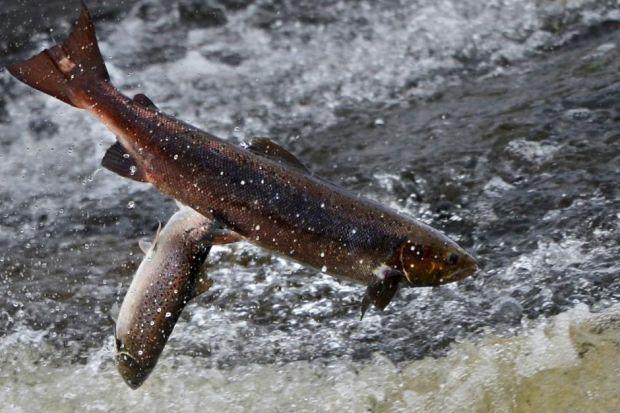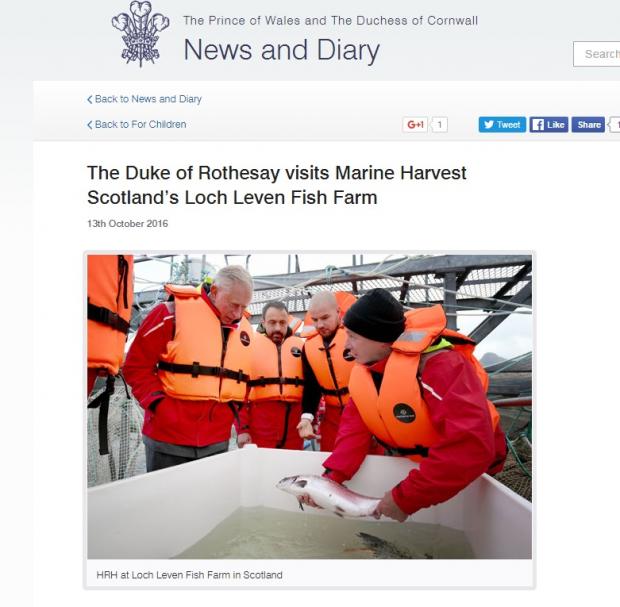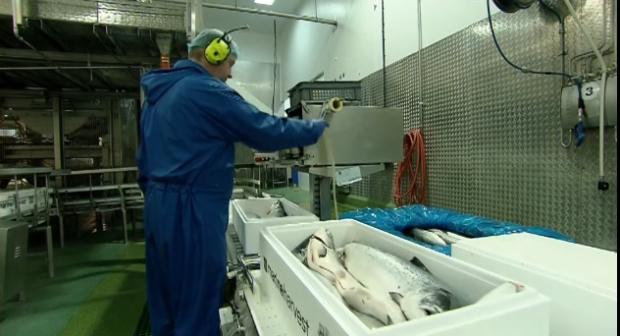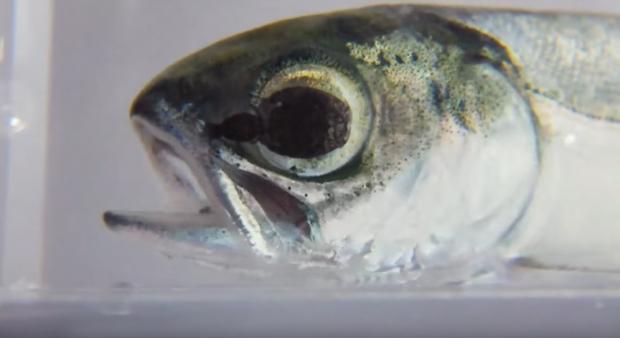Alert over salmon deaths crisis on Scots fish farms caused by infectious disease
 Alert over salmon deaths crisis on Scots fish farms caused by infectious disease
Alert over salmon deaths crisis on Scots fish farms caused by infectious disease
1 day ago / Martin Williams , Senior News Reporter / @MWilliamsHT
CONSERVATIONISTS have called for government action after raising concerns that hundreds of thousands of fish have died from an infectious disease in salmon farms in Hebrides and Wester Ross.
The Salmon and Trout Conservation Scotland has called on Scottish ministers to intervene to protect wild fish after an outbreak of Amoebic Gill Disease (AGD).
It is understood that four farm sites have been affected including West Loch Tarbert and East Loch Tarbert on Harris, Loch Greshornish on Skye and the Isle of Ewe in Wester Ross. Marine Harvest salmon farms have been particularly affected, it is said.
The news comes just two weeks after Prince Charles visited the Marine Harvest salmon farm in Kinlochleven the Highlands to observe work on its “cleaner fish” project.
Salmon and Trout Conservation Scotland said that up to 25 per cent of the stock at the afflicted sites are understood to have been lost, with dead fish transported to Wigan in Greater Manchester for incineration.

Earlier this month Paul Hopper, senior biologist at the Outer Hebrides Fisheries Trust (OHFT) urged fish farmers to keep communication lines open with farmed salmon reported to be locked in the grip of a severe bout of amoebic gill disease and sea lice.
He said that despite it being common knowledge the disease was claiming “substantial numbers” of farmed salmon it had taken some time before fish farmers contacted the OHFT.
S&TCS claimed Marine Harvest was “struggling to manage the situation and has been slow to admit the extent of the problems”.
It said: “AGD is a very unpleasant disease which causes asphyxia; many fish then suffocate to death. S&TCS is adamant that the Scottish Government should act now to protect wild fish.
Mr Hopper warned that incidents of the disease have been recorded in Scotland at water temperatures as low as 7.5°C and so they cannot rely on a drop in sea water temperature to help alleviate the situation imminently.

He said: “We are extremely concerned about AGD in West Loch Tarbert as well as the earlier lack of communication on this outbreak from the company involved.
“Having now held meetings with the local fish farmers, we have been reassured that the industry is working hard to improve the situation through treatments and careful management of their stocks.
“We cannot emphasise enough how important it is for the aquaculture industry to report incidences of diseases like AGD without delay so that all stakeholders can immediately work together to protect both farmed and already threatened wild fish stocks.”
Marine Harvest’s West Loch Tarbert farm is close to the North Harris Special Area of Conservation (SAC) for Atlantic salmon.

Innes Morrison, clerk to the Western Isles Fishery Board and factor at Amhuinnsuidhe Castle Estate said: ” “We are very concerned that, if the disease is not eradicated by the spring, the migrating juvenile salmon from our SAC rivers will be vulnerable to deadly infection.
“In the meantime our sea trout, which remain in coastal waters, will surely be prone to infection. The salmon farming industry in the Western Isles seems to lurch from crisis to crisis – with both disease and sea lice epidemics – and yet virtually all applications for new farms or expansions are still being rubber-stamped by the local council with little if any concern for the environmental impact.”
Bill Whyte, chairman of the Wester Ross Area Salmon Fishery Board, added: “The cloak of secrecy surrounding the presence of AGD at Marine Harvest’s farm in Loch Ewe is inexcusable. This outbreak of AGD must surely prompt further questions as to the suitability and viability of Loch Ewe for salmon farming. Prior to the arrival of the industry in Loch Ewe, the Loch Maree system was an iconic fishery for both wild salmon and sea trout.”
Andrew Graham-Stewart, director of S&TCS, said: “If any terrestrial farming industry was beset by a similarly rampant and highly contagious disease, the authorities would step in immediately and ruthlessly cull all affected stocks.
“But because the fish affected by and dying from AGD are unseen beneath the waves, the Scottish Government adopts a laissez-faire approach. Leaving aside the suffering caused to the fish in the cages, given the potential risks identified by local wild fish experts and the apparent inability of Marine Harvest to eradicate the disease, surely the Government now has a responsibility to intervene and order the immediate slaughter of the farmed stocks in question.”
Steve Bracken, business support manager at Marine Harvest (Scotland) Ltd, said they believe the problem can be kept under control.
“In common with many of the challenges we face as salmon farmers, Amoebic Gill Disease is naturally occurring. It is a result of higher sea temperatures and levels of salinity which are becoming more usual due to climate change.
“We have had challenges in the Western Isles and some mainland sites with AGD during the summer and autumn months but once the sea temperature gets colder the disease lessens and we expect to be clear of it.
“At Marine Harvest we are continuously looking at ways to maintain the health and wellbeing of our salmon. Our experience has been that the best cure for AGD is fresh water which we need more of to resist the disease. We recently acquired a new wellboat with its own desalination plant to turn sea water into fresh water which we use to bathe the salmon and help prevent AGD getting a hold.”
A Scottish Government spokesman said: “Marine Scotland’s Fish Health Inspectorate has received reports of fish mortality associated with gill disease from fish farm sites in the Western Isles and are aware of on-going biological challenges in the area.
“Investigations are ongoing and the Fish Health Inspectorate are currently monitoring the situation.”

Leave a Reply